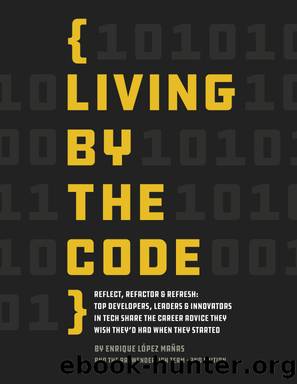Living by the Code by 2021

Author:2021
Language: eng
Format: epub
Publisher: Ray Wenderlich
Leadership is closely tied to mentorship. What are your thoughts on mentorship in our community?
The thing about a mentor relationship is itâs volunteer time from both people, and the time of someone whom you would want mentoring you is extremely valuable. So, while some companies have mentorship programs and people can get involved with them, and they are very official, Iâve found that your career growth is your responsibility. Letâs start with that. That you will have managers and you will have mentors and you will have senior engineers to try to push on you and to try to help you but at the end of the day, you are an adult with a career and your growth is your responsibility.
So recognizing this, itâs critical to your growth to have a very good mentor to give you advice, push you in the right direction, set up accountability and give you the feedback that you need. But if we follow the idea that your career is your responsibility, itâs also your responsibility to drive finding that mentor. I think itâs especially important for a junior engineer. They need to step out of their comfort zone and they need to find someone and be active in advocating for that person to mentor them. They need to be extremely receptive to that personâs feedback as well. What I found before is that as a mentor, your time is valuable. If this person isnât acting on your feedback and adjusting and making you feel like the advice that youâre giving is being utilized, then you might not be interested in continuing that relationship.
Weâve touched on several trends, hereâremote work, career growth, mentorship. Are there any other trends you think are problematic and what would be your solution?
One thing that Iâve noticed in the last few years in the mobile space is a lot of the big companies focusing on creating huge apps with many teams working and creating features for those apps. The apps get quite bloated; you see this in everything from Google to Facebook to Uber. Once we started pushing on further app adoption in the emerging markets, the biggest constraints that came up were lower powered-devices and lower throughput networksâjust a lot of constraints where these large-featured apps were considered problematic. The apps were too big and people canât have them on their device, canât download them on cellular, or their devices are too slow to run these large bloated apps.
So you started to see this prominent trend of creating light apps that are specific to certain regions. And I think, in spirit, thatâs a good idea, recognizing that there are these other markets wherein you do have a large demographic of under-powered devices and trying to account for that. But what weâve seen is that thereâs a demand for light apps in general; itâs not just in those emerging markets. Because once those were available, once you had Facebook Messenger Lite emerged, for example, people in the United States, in Europe and other first-world countries with flagship devices began to prefer the Lite experience.
Download
This site does not store any files on its server. We only index and link to content provided by other sites. Please contact the content providers to delete copyright contents if any and email us, we'll remove relevant links or contents immediately.
Effortless by Greg McKeown(1488)
Word Power Made Easy by Norman Lewis(1314)
How to Not Die Alone by Logan Ury(1314)
Beyond Order by Jordan B. Peterson;(1298)
So Good They Can't Ignore You by Cal Newport(1271)
The Power of 100! by Shaun King(1096)
Chatter by Ethan Kross(1071)
100 Things Successful People Do by Nigel Cumberland(1030)
Master of One by Jordan Raynor(1008)
Lives of the Stoics by Ryan Holiday & Stephen Hanselman(969)
Napolean Hill Collection by Napoleon Hill(948)
The High 5 Habit by Mel Robbins(944)
The Art and Science of Results by Joe Vitale(911)
Be Your Best Self by Mike Bayer(893)
Kinesic Magic by Donald Tyson(848)
Friday Forward by Robert Glazer(841)
Career Fear (and how to beat it) by Somi Arian(836)
The 7 Habits on the Go by Stephen R. Covey(824)
The Practice Is the Path by Tias Little(822)
